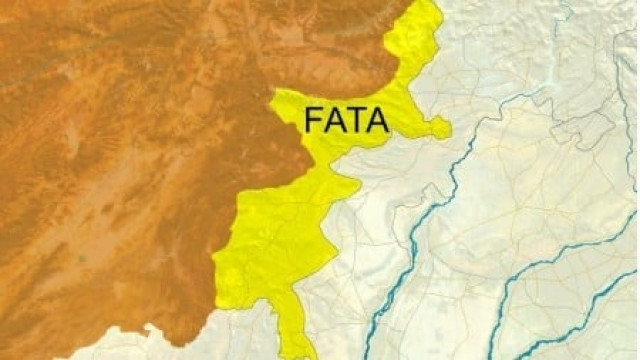Realities of Fata
FATA and its neighbouring areas are not what they are shown to be in the media.

A file photo of a map of FATA. PHOTO: File
In Fata, several tribal females do pursue education. Many of my female cousins, including my sister, have graduated from renowned colleges in Fata. This is true for other families in my neighbourhood as well. There are 13 girls’ degree colleges, out of which 11 are currently operational. T
housands of female students pursue education in these colleges, while roughly 200,000 girls are currently enrolled in government-run primary, middle and secondary schools. These figures do not include the thousands, who are enrolled in private schools. Though there is no co-education at secondary or college level, private schools have co-education at primary and middle school level.
The reality about drones is that an overwhelming majority of tribesmen hate both militants and drones. We hate militants because they have ruined the lives of people and pushed back the advancement of Fata by 10 years.
However, we also hate drones because they give militants the much-needed ideological space and additionally, the collateral damage due to drone attacks means that these drones give birth to more terrorists than they manage to kill — hence, the vicious cycle of unending violence continues.
There is no support for militancy and terrorism in Fata. Since 9/11, we have had thousands of tribesmen killed, thousands of us injured, hundreds of schools destroyed and thousands of homes crushed to the ground. Almost 40 per cent of the 4.5 million people living in Fata have been internally displaced, with nowhere to go. Most of us yearn for peaceful lives.
Not all tribesmen are wild, nor do all disobey the law. In fact, when seen in context, we may be more law-abiding than several people elsewhere in Pakistan. We wholeheartedly follow unwritten laws called tribal customs. Even in the absence of formal police and judicial authorities, the pre-9/11 crime rate in Fata, excluding deaths in tribal feuds, remained lower than that of any settled area of the country.
Fata is not an inaccessible area (Ilaqa-e-Ghair). Barring a few regions (Tirah and Shawal amongst them), no area of Fata is inaccessible. Most of the major towns are an hour to two hours drive away from the urban cities of Khyber-Pakhtunkhwa (K-P).
Tribesmen are not fiercely religious and nor do they only vote for religious parties in elections. Except for the 2002 elections (when the MMA swept the entire Pashtun region from Swat to Quetta), tribesmen have traditionally elected non-religious electables to the assemblies, mostly, of feudal or business backgrounds (though all elections before 1997 were based on “Lungi” system and not adult franchise).
In 2008, religious parties could claim only two to three National Assembly seats out of the total 11 in Fata (elections were not held for the twelfth seat). This time, however, the youth played a major role in elections and policies, thereby proving that religion alone has not decided the fate of electoral candidates.
A beard and a shalwar kameez does not necessarily mean that a person is “wild” or suppressive towards women. I hope that the PTI can enable an environment where Pakistanis can visit the tribal areas and decide for themselves whether we are “wild”.
Published in The Express Tribune, July 8th, 2013.
Like Opinion & Editorial on Facebook, follow @ETOpEd on Twitter to receive all updates on all our daily pieces.














COMMENTS
Comments are moderated and generally will be posted if they are on-topic and not abusive.
For more information, please see our Comments FAQ